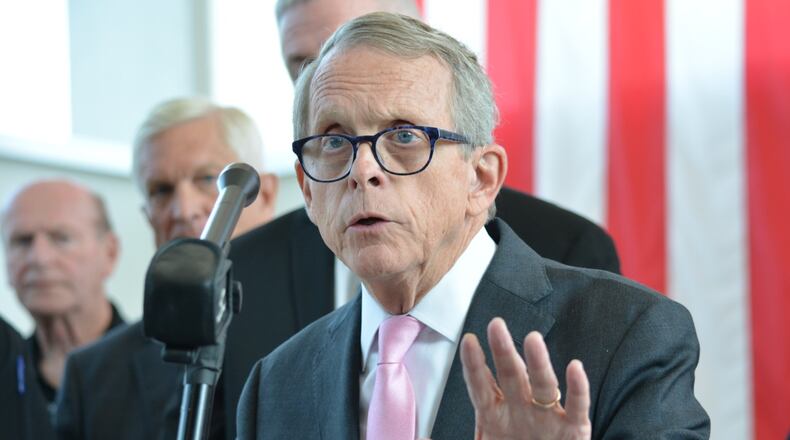“I think refugees are a cultural and economic asset,” said Laura Roesch, CEO of Catholic Social Services of the Miami Valley, the local refugee resettlement agency. “Refugee resettlement is a community issue, and it requires that we work together.”
Refugee admissions have dropped significantly under the Trump administration, and the cap on refugee admissions for fiscal year 2020 is the lowest in modern history, according to experts.
MORE: More refugees — most from Africa — are settling in Dayton
In a Dec. 24 letter, Gov. DeWine told U.S. Secretary of State Mike Pompeo that he authorizes refugees to be placed or resettled in Ohio.
The letter was in response to a September executive order from President Donald Trump that says refugees should only be resettled in states and localities that want and agree to accept them.
“The federal government consults with state and local governments not only to identify the best environments for refugees, but also to be respectful of those communities that may not be able to accommodate refugee resettlement,” the order states.
Trump's order requires states and local jurisdictions to give their consent in writing for resettlement to continue in those places. The White House said this new requirement ensures refugees are placed in environments that give them the best opportunities to thrive.
In his letter, DeWine said the state of Ohio has a long history of welcoming and assimilating refugees from around the globe.
DeWine said the state has a “well-developed” support network for refugees, and he has confidence in federal agencies’ careful vetting process for refugees.
MORE: Refugee numbers in Dayton plummet; Trump restrictions cited
Whaley already sent a letter on Nov. 11 to Pompeo, saying that she consented to initial refugee resettlement in the city of Dayton.
In December, all three Montgomery County commissioners sent nearly identical letters agreeing to continued refugee resettlement in the county.
Whaley said Dayton is an inclusive and welcoming community, and while accepting refugees is a moral obligation, there are many additional benefits, including increased economic opportunities.
RELATED: Welcome Dayton program under fire again
She said refugees and immigrants start businesses and create new jobs, and she credited refugees and immigrants with helping staunch years of population losses in the city.
“Because we are taking so few refugees in across the country, the situations and life struggles they’ve had have been heroic,” Whaley said. “Refugees are people who have come from deadly situations.”
Refugee admissions have plummeted since President Trump took office, falling from 53,700 in fiscal year 2017 to 30,000 in fiscal year 2019, according to the Pew Research Center. The Trump administration set a cap of 18,000 refugee admissions for fiscal year 2020.
From fiscal 2008 to 2017, an average of about 67,100 refugees arrived in the United States each year, the research center said. The ceiling in 2017, set by President Obama, was 110,000 refugee admissions.
The White House said the main goal of the Trump Administration’s refugee policy is to help refugees ultimately return home.
"The United States spends billions of dollars resettling refugees that could be invested in our citizens here at home," the White House said.
The Department of Health and Human Services spent more than $96 billion on programs supporting or benefiting refugees between 2005 and 2014, the White House said, and surveys indicate that nearly half of refugees receive cash assistance and Medicaid.
MORE: Dayton’s immigrant population doubles: ‘You can get a better life’
When Trump issued the executive order, many people believed the consent requirement would be a significant new restriction on refugee resettlement admissions, Mark Greenberg, senior fellow with the Migration Policy Institute in Washington, D.C.
“There was tremendous concern that this was going to generate conflict, division and further restrict the number of refugee admissions,” he said. “So far, what’s been notable is the extent of bipartisan support for refugee resettlement that has been communicated by governors and local elected officials.”
A state department website indicates that the governors of about 25 states and officials of a variety of jurisdictions have submitted written consent letters.
But refugee resettlement agencies that are tracking consent submissions have a much larger tally of 39 states and dozens of cities and other local governments, Greenberg said.
The state department’s list does not feature Ohio, the city of Dayton, Montgomery County or other agencies.
Greenberg said it is unclear whether the executive order will have long-term effects.
Catholic Social Services of the Miami Valley has helped resettle refugees for more than 60 years and serves a 10-county area.
The region is expected to welcome about 189 newly arriving refugees in 2020, most of whom come from the Democratic Republic of the Congo, said Roesch, with Catholic Social Services of the Miami Valley. About 99 percent of arriving refugees will be placed in the city of Dayton, where they will be close to health care providers, public transportation job opportunities and affordable housing, Roesch said.
Overall, Catholic Social Services expects to serve about 300 refugees this year.
People have many misconceptions about refugees and often do not realize that the vetting process is lengthy, extensive and comprehensive, and refugees are legal upon arrival to the United States and are fleeing terrible violence, war, persecution and ethnic cleansing, Roesch said.
About the Author

